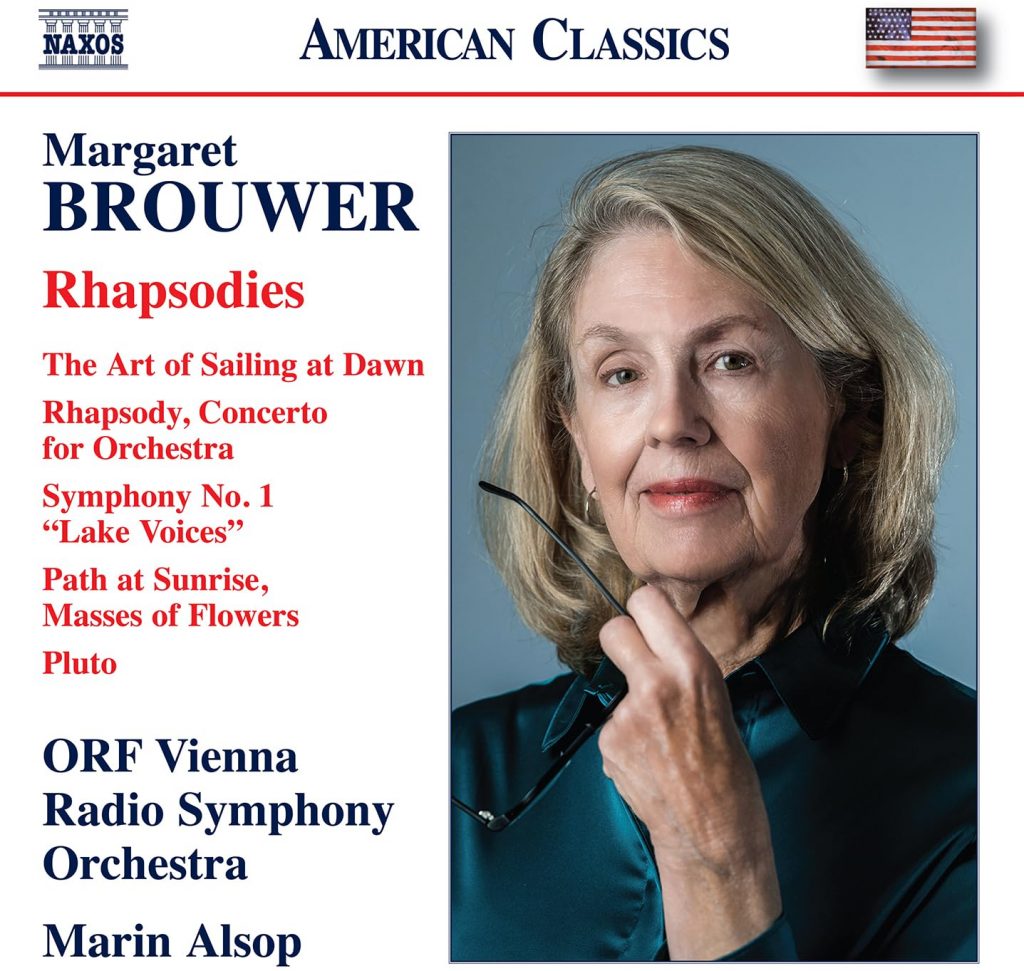by Daniel Hathaway

Sensitive performances of Brouwer’s well-constructed works by Marin Alsop and the ORF Vienna Radio Symphony offer examples of contemporary music that can be both sophisticated and accessible. Here’s proof that a composer’s emotional reactions to sights and sounds can be translated into music and shared with others in fresh and evocative ways.
Several works are inspired by Brouwer’s deep personal relationship with The Great Lakes — she grew up in a Dutch community on one of them (Michigan) and lives on another (Erie). Her childhood memories of her father sailing early in the morning when all was still except for the quiet sounds of nature sets the scene for The Art of Sailing at Dawn. Beginning with a sunrise on a more human scale than Daphnis and Chloe’s, it builds to a terrifying fortissimo when a storm suddenly blows up.
Her First Symphony, Lake Voices, written in three connected movements, is both a description and a polemic. The beauty of the lake is sullied by trash and pollution — a situation Brouwer has revisited in her Lake Erie oratorio, The Voice of the Lake — and ringing bells toll a warning to call people to action.
Path at Sunrise, Masses of Flowers was inspired by an explosion of flora that surprised Brouwer while exercising her dog early in the morning near New York’s Natural History Museum. This stirred up a range of personal emotions: “sadness — acceptance — gratitude — and appreciation for the beauty of the flowers and the sun.” It’s a fluid piece about a gentle walk that leaves colorful sounds ringing in the ears. Alsop leads an unhurried performance that allows each harmonic cell to expand in slow motion.
Brouwer’s orchestral creations tend to be like jigsaw puzzles of harmony and color with ear-catching filigree sprinkled throughout. These qualities come through brilliantly in Rhapsody, Concerto for Orchestra, written to feature the principal players as well as the sectional and ensemble virtuosity of the Detroit Symphony.
“Regrets” begins slowly with transparent musical gestures passed seamlessly from section to section. “Airs and Rhapsodies” opens with an attractive melodic line in the strings. A beautifully played English horn solo leads to orchestral cloudbursts.
Catchy rhythms in the percussion introduce the concluding “Dance.” Long, fast tutti scalar passages are played with clarity and flair as short rhythmic motives are passed around the orchestra. Each section has its moment in the spotlight.
The album concludes dramatically with Pluto, commissioned by the Roanoke Symphony to add a ninth heavenly body to a performance of Gustav Holst’s The Planets (Brouwer has also written a version that includes a female chorus.)
Since Pluto the planet’s status has been downgraded, Brouwer has based her piece on the attributes of Pluto the god of the Underworld — aggressive, passionate, violent, intense, favoring war and extremes, inexorable but just — bringing it more in line with Holst’s astrological inspiration.
Fast rhythmic passages build and retreat in the brass and percussion, as long lines in the strings are wonderfully interrupted by short glistening fanfares. Brouwer describes its calmer middle section as “suggesting the time in Pluto’s orbit when it comes close to the restoring warmth of the sun.” The Vienna Radio Symphony produces a full, well-balanced sound no matter what dynamic is required.
Published on ClevelandClassical.com September 12, 2024.
Click here for a printable copy of this article


